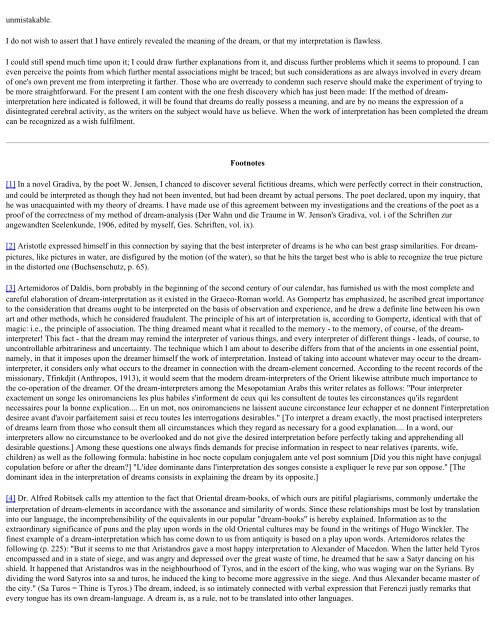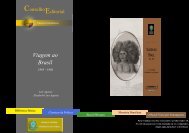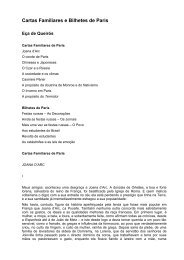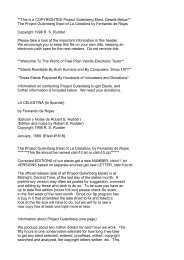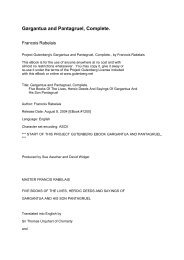The Interpretation of Dreams Sigmund Freud (1900)
The Interpretation of Dreams Sigmund Freud (1900)
The Interpretation of Dreams Sigmund Freud (1900)
You also want an ePaper? Increase the reach of your titles
YUMPU automatically turns print PDFs into web optimized ePapers that Google loves.
unmistakable.<br />
I do not wish to assert that I have entirely revealed the meaning <strong>of</strong> the dream, or that my interpretation is flawless.<br />
I could still spend much time upon it; I could draw further explanations from it, and discuss further problems which it seems to propound. I can<br />
even perceive the points from which further mental associations might be traced; but such considerations as are always involved in every dream<br />
<strong>of</strong> one's own prevent me from interpreting it farther. Those who are overready to condemn such reserve should make the experiment <strong>of</strong> trying to<br />
be more straightforward. For the present I am content with the one fresh discovery which has just been made: If the method <strong>of</strong> dreaminterpretation<br />
here indicated is followed, it will be found that dreams do really possess a meaning, and are by no means the expression <strong>of</strong> a<br />
disintegrated cerebral activity, as the writers on the subject would have us believe. When the work <strong>of</strong> interpretation has been completed the dream<br />
can be recognized as a wish fulfilment.<br />
Footnotes<br />
[1] In a novel Gradiva, by the poet W. Jensen, I chanced to discover several fictitious dreams, which were perfectly correct in their construction,<br />
and could be interpreted as though they had not been invented, but had been dreamt by actual persons. <strong>The</strong> poet declared, upon my inquiry, that<br />
he was unacquainted with my theory <strong>of</strong> dreams. I have made use <strong>of</strong> this agreement between my investigations and the creations <strong>of</strong> the poet as a<br />
pro<strong>of</strong> <strong>of</strong> the correctness <strong>of</strong> my method <strong>of</strong> dream-analysis (Der Wahn und die Traume in W. Jenson's Gradiva, vol. i <strong>of</strong> the Schriften zur<br />
angewandten Seelenkunde, 1906, edited by myself, Ges. Schriften, vol. ix).<br />
[2] Aristotle expressed himself in this connection by saying that the best interpreter <strong>of</strong> dreams is he who can best grasp similarities. For dreampictures,<br />
like pictures in water, are disfigured by the motion (<strong>of</strong> the water), so that he hits the target best who is able to recognize the true picture<br />
in the distorted one (Buchsenschutz, p. 65).<br />
[3] Artemidoros <strong>of</strong> Daldis, born probably in the beginning <strong>of</strong> the second century <strong>of</strong> our calendar, has furnished us with the most complete and<br />
careful elaboration <strong>of</strong> dream-interpretation as it existed in the Graeco-Roman world. As Gompertz has emphasized, he ascribed great importance<br />
to the consideration that dreams ought to be interpreted on the basis <strong>of</strong> observation and experience, and he drew a definite line between his own<br />
art and other methods, which he considered fraudulent. <strong>The</strong> principle <strong>of</strong> his art <strong>of</strong> interpretation is, according to Gompertz, identical with that <strong>of</strong><br />
magic: i.e., the principle <strong>of</strong> association. <strong>The</strong> thing dreamed meant what it recalled to the memory - to the memory, <strong>of</strong> course, <strong>of</strong> the dreaminterpreter!<br />
This fact - that the dream may remind the interpreter <strong>of</strong> various things, and every interpreter <strong>of</strong> different things - leads, <strong>of</strong> course, to<br />
uncontrollable arbitrariness and uncertainty. <strong>The</strong> technique which I am about to describe differs from that <strong>of</strong> the ancients in one essential point,<br />
namely, in that it imposes upon the dreamer himself the work <strong>of</strong> interpretation. Instead <strong>of</strong> taking into account whatever may occur to the dreaminterpreter,<br />
it considers only what occurs to the dreamer in connection with the dream-element concerned. According to the recent records <strong>of</strong> the<br />
missionary, Tfinkdjit (Anthropos, 1913), it would seem that the modern dream-interpreters <strong>of</strong> the Orient likewise attribute much importance to<br />
the co-operation <strong>of</strong> the dreamer. Of the dream-interpreters among the Mesopotamian Arabs this writer relates as follows: "Pour interpreter<br />
exactement un songe les oniromanciens les plus habiles s'informent de ceux qui les consultent de toutes les circonstances qu'ils regardent<br />
necessaires pour la bonne explication.... En un mot, nos oniromanciens ne laissent aucune circonstance leur echapper et ne donnent l'interpretation<br />
desiree avant d'avoir parfaitement saisi et recu toutes les interrogations desirables." [To interpret a dream exactly, the most practised interpreters<br />
<strong>of</strong> dreams learn from those who consult them all circumstances which they regard as necessary for a good explanation.... In a word, our<br />
interpreters allow no circumstance to be overlooked and do not give the desired interpretation before perfectly taking and apprehending all<br />
desirable questions.] Among these questions one always finds demands for precise information in respect to near relatives (parents, wife,<br />
children) as well as the following formula: habistine in hoc nocte copulam conjugalem ante vel post somnium [Did you this night have conjugal<br />
copulation before or after the dream?] "L'idee dominante dans l'interpretation des songes consiste a expliquer le reve par son oppose." [<strong>The</strong><br />
dominant idea in the interpretation <strong>of</strong> dreams consists in explaining the dream by its opposite.]<br />
[4] Dr. Alfred Robitsek calls my attention to the fact that Oriental dream-books, <strong>of</strong> which ours are pitiful plagiarisms, commonly undertake the<br />
interpretation <strong>of</strong> dream-elements in accordance with the assonance and similarity <strong>of</strong> words. Since these relationships must be lost by translation<br />
into our language, the incomprehensibility <strong>of</strong> the equivalents in our popular "dream-books" is hereby explained. Information as to the<br />
extraordinary significance <strong>of</strong> puns and the play upon words in the old Oriental cultures may be found in the writings <strong>of</strong> Hugo Winckler. <strong>The</strong><br />
finest example <strong>of</strong> a dream-interpretation which has come down to us from antiquity is based on a play upon words. Artemidoros relates the<br />
following (p. 225): "But it seems to me that Aristandros gave a most happy interpretation to Alexander <strong>of</strong> Macedon. When the latter held Tyros<br />
encompassed and in a state <strong>of</strong> siege, and was angry and depressed over the great waste <strong>of</strong> time, he dreamed that he saw a Satyr dancing on his<br />
shield. It happened that Aristandros was in the neighbourhood <strong>of</strong> Tyros, and in the escort <strong>of</strong> the king, who was waging war on the Syrians. By<br />
dividing the word Satyros into sa and turos, he induced the king to become more aggressive in the siege. And thus Alexander became master <strong>of</strong><br />
the city." (Sa Turos = Thine is Tyros.) <strong>The</strong> dream, indeed, is so intimately connected with verbal expression that Ferenczi justly remarks that<br />
every tongue has its own dream-language. A dream is, as a rule, not to be translated into other languages.


